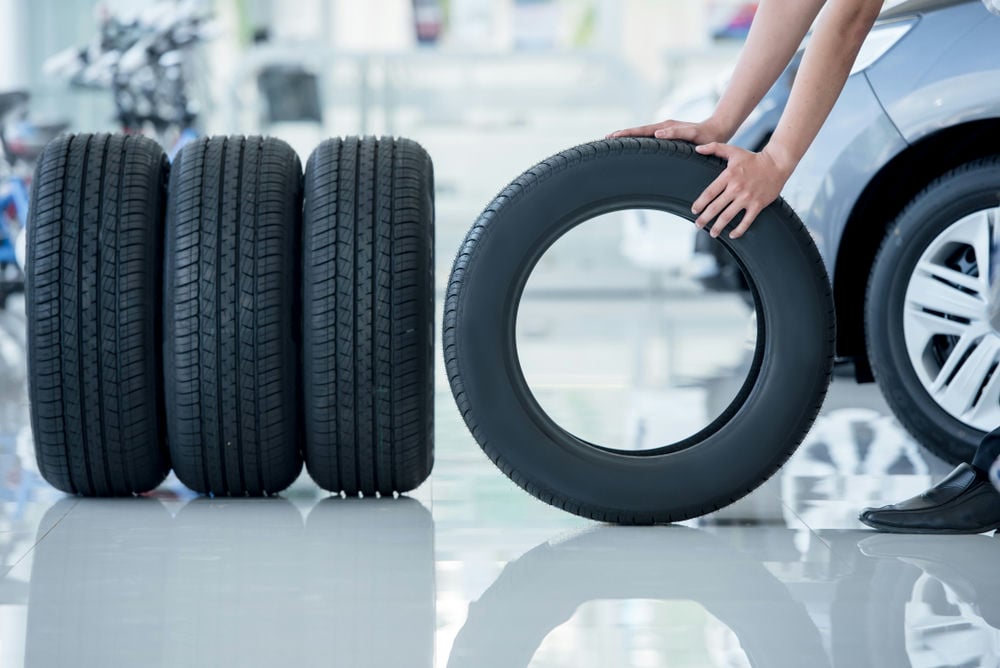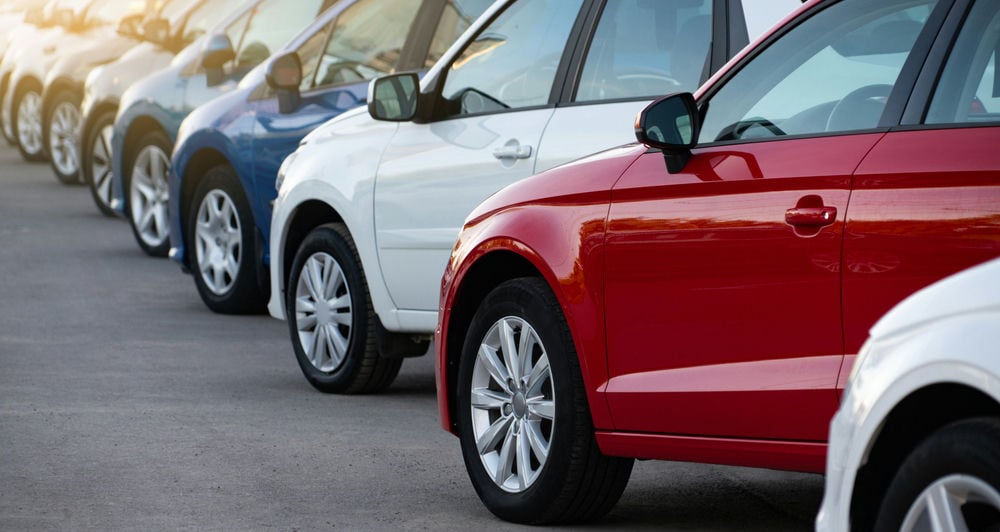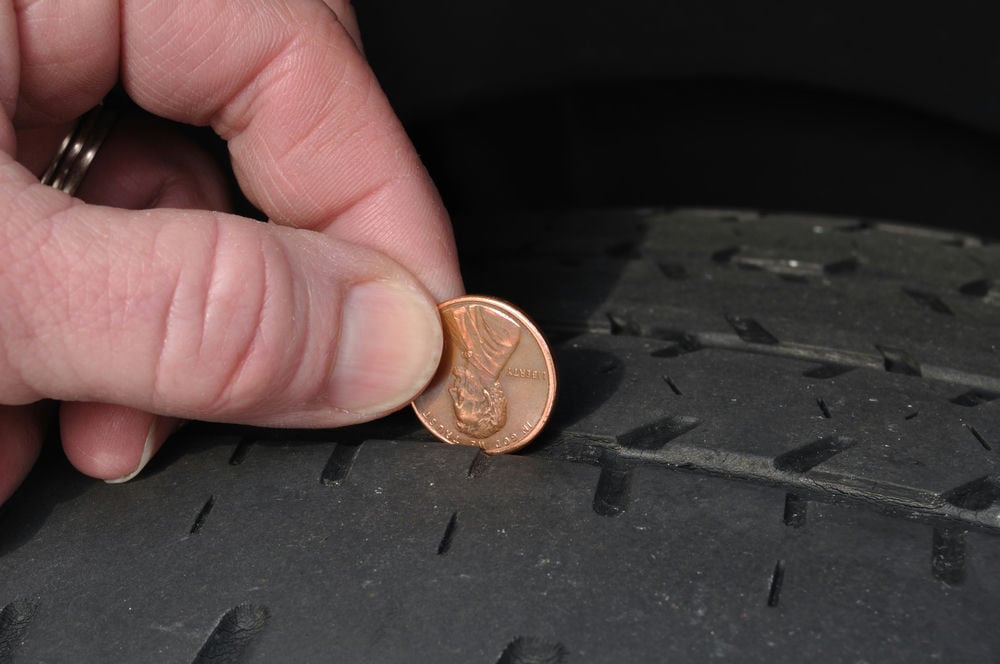A common complaint among new car owners these days: their new factory tires
don't seem to last very long without wearing out. They may be onto
something here.
Many new car factory tires are made to prioritize factors such as quiet
operation, low rolling resistance, and a comfortable ride over maximum
tread life, often to increase vehicle sales. Additionally, the tires
that come as original equipment with a new car may be lower in cost and
quality than aftermarket alternatives.
If you want to know more about some of the issues with new car tires, keep
reading!
 New factory tires at the car dealership.
New factory tires at the car dealership.
How Long Should Tires Last On A New Vehicle?
The lifespan of the tires on a new vehicle can vary depending on several
factors, such as driving habits, climate, road conditions, and vehicle
weight.
On average, tires will last 25,000 to 50,000 miles, with some lasting as
long as 80,000 miles. However, getting your tires rotated regularly and
properly inflated can help increase their lifespan.
It's important to note that tire age is also an essential factor since
tires degrade over time even if they aren't worn out.
The National Highway Traffic Safety Administration (NHTSA) recommends
replacing tires every six years regardless of mileage, as the rubber in
tires deteriorates over time and can become less effective.
 A new car with worn factory tires.
A new car with worn factory tires.
Do Factory Tires Wear Faster?
Factory car tires are designed to meet the specific needs of the vehicle
they're installed on and to work well under a wide range of conditions.
However, they may wear out faster than aftermarket tires, depending on the
specific circumstances of their use.
This is because factory tires are often designed with other considerations
besides maximum tread life.
While keeping this in mind, many other factors can affect how quickly tires
wear out, such as the driver's habits, the climate, and road conditions.
Regular tire maintenance, such as checking the tire pressure, rotating
tires, and having them balanced, can help prolong tire life.
It's also worth noting that new cars often come with a limited tread life
warranty on the tires that covers only a specific mileage or period,
regardless if they are factory or aftermarket tires.
So, it's always good to check the warranty information of the tire before
buying.
 A lineup of new cars with factory tires.
A lineup of new cars with factory tires.
How Long Should Dealer Tires Last?
Most dealer or factory tires can be expected to last between 20,000 to
50,000 miles before needing to be replaced.
The average lifespan of dealer tires can vary greatly, depending on the
care given to them and the general conditions of the vehicle and the roads
being driven on.
You may get well over 50,000 miles with proper care and safe driving.
The opposite is also true, though, so you may not even get the low-end
average of 20,000 miles out of your dealer tires if you don't take care of
them.
What Causes The Most Tire Wear?
Several factors can cause tire wear, but some of the most common include
the following:
-
Overinflation or underinflation
-
Misalignment
-
Unbalanced tires
-
Overloading vehicle weight
-
Aggressive driving
-
Poor road conditions
Regular maintenance, such as checking tire pressure, rotating tires, and
balancing them regularly, can help prolong tire life.
It's also a good idea to do a wheel alignment check whenever you get new
tires or notice uneven wear on your current tires.
 A worn factory tire.
A worn factory tire.
How Often Should New Tires Be Rotated?
The tire rotation frequency can vary depending on the manufacturer's
recommendation or the driving conditions.
Generally, tires should be rotated every 6,000 to 8,000 miles or every six
months, whichever comes first. This is true for most passenger cars,
minivans, SUVs, and trucks.
However, this can vary depending on the vehicle, driving conditions, and
the type of tire.
You should check your vehicle's owner's manual or the tire manufacturer's
recommendations for the specific rotation interval and pattern since some
vehicles may have different requirements.
Having your vehicle's tires rotated while you have the oil changed or
performing other routine maintenance is also a good idea.
Do New Cars Have Good Tires?
Even though new car tires may not be the same quality as high-end
aftermarket tires, most are still good tires.
They're usually made to give you a quiet, comfortable ride while being as
gas-efficient as possible.
The quiet ride helps sell the vehicle during test drives at the dealership.
The fact that they may wear out more quickly than normal shouldn't negate
the positive qualities that they can offer.
Most modern car manufacturers will ensure that their new vehicles are
equipped with dependable quality tires.
Conclusion
Many new car factory tires don't last as long as we might like.
That said, the tires that are equipped on most new cars are still reliable,
which will give your vehicle a fuel-efficient and comfortable ride.